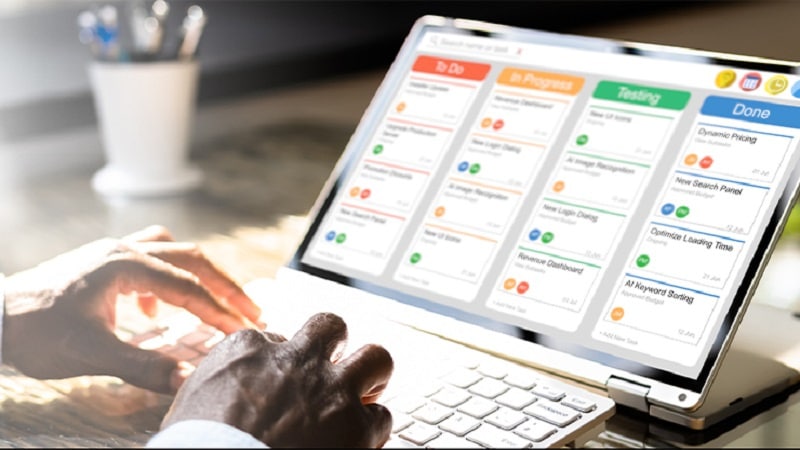
Staying ahead of the competition in the ever-evolving business landscape requires a deep understanding of the latest trends in management software.
Outdated systems and inefficient processes can hinder growth, limit productivity, and prevent businesses from reaching their full potential. The need for revolutionizing business practices and embracing cutting-edge solutions has become more crucial.
Imagine streamlining your operations, maximizing productivity, and gaining a competitive edge. With the latest trends in management software, you can achieve all that and more. This blog will dive deep into the transformative technologies reshaping the business landscape, helping you make informed decisions that will drive your business forward.
What is Management Software?

Management software is a category of software applications designed to assist businesses and organizations in managing various aspects of their operations, processes, and resources. These software solutions like Inspectorio are designed to streamline and automate tasks, improve efficiency and help with decision-making.
Within an organization, management software can be used for a wide range of tasks and departments, including:
- Project Management
- Customer Relationship Management (CRM)
- Human Resources Management (HRM)
- Inventory and Supply Chain Management
- Financial Management
- Document Management
The Latest Trends in Management Software
The current advancements in management software primarily revolve around simplifying business operations, enhancing communication, and fostering efficient collaboration. Here are a few prominent trends gaining popularity:
1. AI-Powered Solutions
Incorporating artificial intelligence (AI) into management software has revolutionized decision-making processes. AI-driven tools can analyze vast amounts of data, identify patterns, and provide valuable insights, enabling managers to make informed decisions faster.
Whether it’s predictive analytics, machine learning algorithms, or natural language processing, AI empowers organizations to stay ahead of the curve.
2. Cloud-Based Platforms
The migration to cloud-based management software continues to be a game-changer for businesses of all sizes. Cloud solutions offer unmatched flexibility and scalability, allowing teams to access data and applications from any location with an internet connection. The latest cloud platforms ensure seamless collaboration, data security, and automatic updates.
3. Integration of the Internet of Things (IoT)
The influence of the Internet of Things (IoT) propels the convergence of physical and digital realms. Within management software, integrating IoT capabilities empowers the monitoring and control of diverse devices and processes.
By enabling real-time inventory tracking and optimizing energy consumption, management systems driven by IoT revolutionize efficiency and enhance the allocation of resources.
4. Blockchain Solutions
Blockchain technology has emerged as a prominent contributor to upholding data security and transparency within management software. Businesses can maintain a tamper-resistant record of transactions and operations by employing decentralized ledgers.
This trend is particularly relevant in supply chain management, financial transactions, and identity verification, where data integrity and trust are paramount.
5. Virtual and Augmented Reality (VR/AR)
VR and AR technologies are no longer limited to entertainment; they have found their way into management software.
Organizations utilize these immersive technologies for employee training, product visualization, and simulations. By offering realistic and interactive experiences, VR/AR enhances learning outcomes and aids in complex decision-making processes.
6. Enhanced Data Security Measures
As cyber threats evolve, management software providers focus on bolstering data security measures. Advanced encryption, multi-factor authentication, and proactive threat detection are standard features in modern management solutions. Businesses can now rest assured that their critical information remains protected from unauthorized access and cyberattacks.
7. Mobile Optimization
With the growing reliance on mobile devices, management software is undergoing optimization for seamless performance on smartphones and tablets. Mobile-responsive interfaces allow managers to access key data and functionalities while moving, enabling real-time decision-making and improved productivity.
8. Emphasis on User Experience (UX)
User experience (UX) is at the forefront of software design, and management solutions are no exception. Intuitive interfaces, streamlined workflows, and personalized dashboards are being integrated to enhance the user experience.
By reducing the learning curve and increasing user satisfaction, businesses can maximize their software adoption rates and, in turn, productivity.
9. Predictive Maintenance
Predictive maintenance is gaining momentum in industries relying heavily on machinery and equipment. By utilizing sensor data and machine learning algorithms, management software can predict maintenance needs and potential failures before they occur.
10. Remote Team Collaboration

In the wake of remote work, management software is evolving to accommodate seamless team collaboration. With features like virtual meetings, document sharing, and project tracking, remote teams can effectively coordinate tasks and maintain productivity regardless of location.
11. Sustainable and Eco-Friendly Solutions
As environmental concerns take center stage, businesses seek management software aligning with their sustainability initiatives. Eco-friendly solutions that optimize resource usage and reduce carbon footprints are becoming increasingly attractive. Organizations can uphold their social responsibility while enhancing operational efficiency.
12. Embracing Low-Code/No-Code Platforms
Low-code and no-code platforms empower businesses to build and customize management solutions with minimal coding knowledge. This democratization of software development speeds up the deployment process and fosters innovation within organizations.
Non-technical personnel can actively participate in creating tailored software solutions for their specific needs.
13. Data Visualization
Presenting complex data visually appealingly is key to comprehending trends and insights. Data visualization tools within management software enable the creation of interactive charts, graphs, and infographics. Managers can quickly interpret data, identify patterns, and make informed decisions.
14. Emphasis on Predictive Analytics
Predictive analytics is becoming indispensable for businesses seeking a competitive edge. Management software equipped with predictive analytics empowers organizations to anticipate customer behavior, predict market trends, and forecast business performance. With these new insights, organizations can develop proactive strategies and stay ahead of their competitors.
15. Focus on Emotional Intelligence (EI)
Management software is now integrating features that promote emotional intelligence in leadership and team dynamics. From the sentimental analysis in employee feedback to AI-powered chatbots that empathize with users, these tools recognize the importance of emotional intelligence. Management software also fosters a positive work culture and enhances employee satisfaction.
Step into the Future of Business
The evolution of management software is an ongoing journey that businesses cannot afford to overlook. Regardless of size or industry, businesses can benefit from cutting-edge management software. This tool is crucial to stay agile and adapt to the ever-evolving digital landscape.
The speed at which technology evolves demands continuous learning and a proactive approach to remain competitive.










